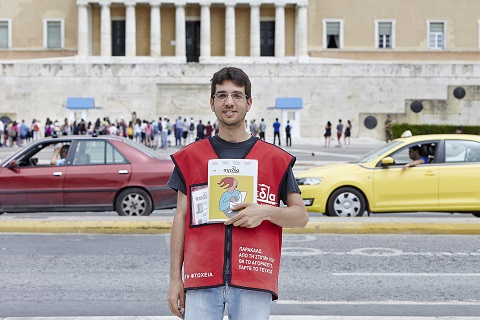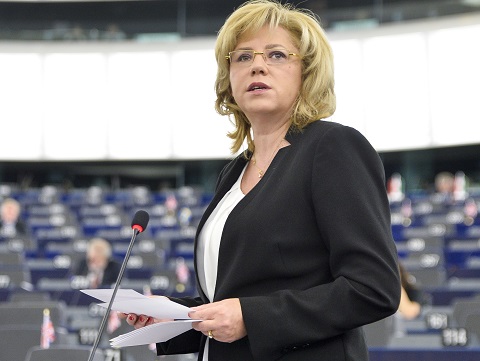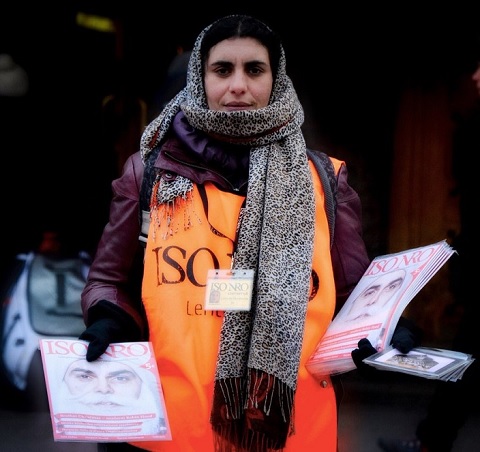The human consequences of the Greek debt crisis were obvious as delegates from INSP’s worldwide street papers touched down in Athens for the 20th Global Street Paper Summit. Bankruptcy and job loss have forced many onto the streets.
Three years ago, Greece’s Shedia emerged in response to this crisis. The street paper offers a way for people who have lost everything to make money and regain their dignity. Its enormous success is both a heartening show of solidarity – and a sad reflection of just how many people now need that help.
The recession has reshaped the Greek political landscape too. The left-wing Syriza party came to power in 2015, running on an anti-austerity platform that led them into direct conflict with Greece’s ‘Troika’ of lenders (the European Commission, the International Monetary Fund and the European Central Bank).
Their economic position was shaped by the new Minister for Finance, Yanis Varoufakis. With his persuasive dissection of EU fiscal policy and the crippling austerity its bailouts have visited upon Greece – as well as his chiselled looks – the eloquent firebrand became a hero of the left. Yet, just months into his tenure, he quit in protest at the latest bailout deal accepted by his former ally, Greek Prime Minister Alexis Tsipras.

Though he left government last July, Varoufakis has not quit politics. He has continued to campaign across Europe for causes that are close to his heart – for the UK to remain in Europe, for universal basic income in Switzerland – and has launched his Democracy in Europe Movement 2025.
At the INSP summit 2016 on 14 June – before the campaign to keep the UK in Europe failed – he delivered a rousing address to 120 delegates from 59 different street papers, in 30 countries. He argued that homelessness is an inevitable outcome of capitalism and praised the street paper movement for its contribution to society, and democracy. The live video of the event has been viewed more than 3,000 times and is still available here.
With enthusiastic applause filling the hall, Varoufakis then sat down to take questions from global street paper staff and vendors. In a wide-ranging conversation, he warned that Brexit would speed the overall break-up of Europe, and that the continent can expect a worsening economic crisis as a result. In the current climate, he said, street papers are “a lifeline”.
What did you think of the Global Street Paper Summit?
The discussion, the overall give and take, the vibe was excellent. There is a wonderful irony to publications like The Big Issue or Shedia, or any of the variety of these publications. If you succeed in dealing with the issue that you are attempting to deal with, you effectively annul your own business. I felt exactly that way when I had a short stint as finance minister as the bank of the state. I felt that my job was to effectively make changes and have an impact so that I would no longer be necessary.
There is something of great character to the street paper endeavour. I call it the partial gift exchange. The partial gift exchange of the transaction involved. When you buy a copy of The Big Issue, or Shedia, this is not exactly an act of philanthropy, it is not a gift – you get something. And having read several issues of these two newspapers, indeed I can safely say that you get a lot better quality than buying commercial. It’s not a gift – it’s a partial gift exchange between vendor and buyer.
As well as what the street paper movement does for people experiencing homelessness, the INSP summit is a gathering of independent media. Can independent media be a powerful force?
It can inject some life into democracy, because the non-independent media sucks the blood out of democracy. Especially here in Greece, we can see that in full technicolor. You have bankrupt banks that effectively own the media, because the media is also bankrupt and they only way that they can keep going is through financing of loans that they can never repay, from the bankrupt banks, who then rely on the Troika of lenders for their own continued existence. So in that case you have a direct chain of command from creditors to what the media say. That is the end of democracy.

Can Shedia help?
Of course. The media scene of any country that has collapsed is also in a kind of moral and journalistic crisis. The systemic media in Greece has begun to resemble the Soviet Union’s media. Back in the 1970s and 80s in the Soviet Union, there was one party line and the media kept regurgitating that line, but no one believed it. So there is good news and there is bad news. The bad news is that there is no journalism to speak of and there is one shoddy, toxic party line blasting out of every television set and every radio station – more or less, with very few exceptions from the independent media. But the good news is that no one believes this propaganda any more. So publications like Shedia are a lifeline.
Do you think that social businesses like Shedia, Myrtillo Café (which employs people from vulnerable groups) and Wise Greece (which sells quality Greek products and uses the profits to feed homeless people) provide an effective response to the Greek crisis?
No, they don’t. They’re not. They’re important, but they are not an effective response to the Greek crisis. It’s too big and even though solidarity at the level of families and at the level of communities, including the social entrepreneurship examples that you mentioned, ameliorates for the pain and soothes it, it cannot stop it. It cannot be a permanent lasting solution to the problem.
“The establishment hates me. The non-establishment don’t hate me.”
When we’ve spoken to people here, it’s clear that you are quite a divisive figure in Greece…
The establishment hates me. The non-establishment don’t hate me. Businesses and organisations that depend on Brussels money, of course, see me as a threat because I oppose Brussels – I oppose their source of funding. They understand on which side their toast is buttered. And then there’s the rest.
For ‘the rest’, you did get something of a heart throb reputation…
You don’t expect me to comment on this, do you?
Well, ‘the handsome Mr Varoufakis’ was a common sentence, in the UK media at least…
It was a surprise. But also an unpleasant surprise, because every time this kind of lifestyle discussion came up, I knew that the issues were not being discussed. It was an attempt to trivialise the issues and to shift the emphasis from the particular proposals, the practical proposals for solving problems.
You’ve opposed the conditions of repayment for Greece, in quite dramatic terms. You’ve accused Greek’s creditors of ‘financial waterboarding’, for example. But are there changes that should be made? For example, streamlining Greek government, ending tax evasion…
I was vilified even for that! Let’s face it, you go to [Greek island] Mykonos, nobody pays tax. On an island where there is so much money being made, every time the tax inspector goes to Mykonos, everyone knows when he arrives, who he is. Everywhere he walks, they start issuing receipts and then when he leaves, they stop.
The only way of dealing with that is to put the fear of god into vendors’ hearts and minds that the next customer might be wired. I was vilified for suggesting that. So of course I think that we should be doing something. The great irony is that I was simultaneously being attacked for not accepting reforms, and for proposing reforms.

You have been campaigning for Remain in the UK’s EU Referendum. Do you still think that is the right choice?
I campaign extensively for a ‘radical in’ vote. The worst enemies of the Remain campaign are people like David Cameron and Tony Blair, who are campaigning on our side. With friends like that, why do you need Boris Johnson? My reasons why Britain should stay in are not Cameron’s reasons.
Similarly, the Brexit campaign has a very good argument regarding democratic sovereignty which has been ceded to a large extent to an undemocratic – anti-democratic, I should say – cabal of bureaucrats and institutions.
So you may say, ok, so why am I against Brexit? The reasons are two. First one is – you cannot leave, even if you vote to leave. You are stuck in the single market. The same lack of sovereignty will continue when it comes to writing the rulebook for a great variety of economic and social activities. So why do you want to get out, if you can’t get out? By getting out, you are ceding authority over all these rules and regulations to an alien force in Brussels, in which you are not even participating.
The second reason is that Brexit will speed up the political process of Europe’s disintegration. And that of course, is going to make the economic crisis worse in Europe. That economic crisis, as it gets worse in Europe, is going to suck Britain into a new depression. Even if you have left, that will happen.
So, in this context, since there are no great gains – and there are large costs for a Europe that will be nasty, brutish and it will push the United Kingdom into developments that you don’t want. Together with my colleagues in Britain – Caroline Lucas of the Green Party, John McDonnell – my message is in, and against. We stay in and we fight against the establishment. It’s the only chance we have.
“Brexit will speed up the political process of Europe’s disintegration”
Can you understand why people might be angry at the EU?
Europeans are turning against the European Union because of its hypocrisy. When it suits the established order to interfere, they interfere in a way that is akin to invasion. Last year they shut down our banking system to impose cuts upon the Greek government. In 1967 we had a coup d’état using tanks, last year we had a coup d’état using banks. There can be no greater interference in the life of a country than to close down its banks. And at other times, when you have clearly misanthropic government interventions which violate the rulebook of the European Union, as we do today in Hungary, in Poland, in Romania, sadly interference is not an important principle. Any union that disrespects consistency to such an extent eventually turns its people against it. And I say this as someone who does not want to see the European Union disintegrated but who feels that it is increasingly difficult to convince people out there that we should not allow it to perish.

Do you think the German government has deserved the bad reputation they have got out of the negotiations with Greece? Merkel has been vilified on the one hand for that, but on the other hand has been lauded for her stance on welcoming refugees…
No one deserves to be vilified, but the German government needs to be criticised severely because it is in denial about things that need to be done. This denial costs human lives. So no vilification, but sharp criticism – and I hope that this criticism comes from the people of Germany. The people of Germany do not deserve the rubbish they are getting from their own government. At the moment they haven’t felt the full brunt of the crisis that their government is cultivating. But they will feel it. And when they do feel it, it will be very, very difficult.
So you think that will hit them too?
It is already hitting them. Already you can see Alternative für Deutschland picking up votes, negative interest states depleting the savings of the fabled Swabian housewife. You already see that there is discontent. It’s not as bad as in Greece but surplus countries always get it later.
As for the refugee crisis – when Mrs Merkel came out last September with her famous ‘Germany embraces you’ speech, I was amongst the first to congratulate her. Actually I wrote an article in Frankfurter Allgemeine Zeitung saying that as a European, I feel proud because of Mrs Merkel. After that, by October/November there was a backlash within the Christian Democratic Party and Mrs Merkel signalled to the Austrian government to close down the borders. Especially when she negotiated the new treaty with Turkey; that was when she lost all credibility in my mind, even with regard to the refugee crisis.

Switzerland recently rejected universal basic income. Was that a mistake?
I participated in the debates in Switzerland. I explained why universal basic income is becoming a necessity. It is not only something we’d like to have from the point of view of social justice but a necessity for stabilising capitalism.
Technological innovations now are going to reach a tipping point. For the first time in the history of the last 300 years, new technology will destroy more jobs that it creates. Up until now, they have been destroying jobs, but they have been creating even more. Now we’re in the process of destroying hundreds of millions of jobs without creating anything like that number.
Increasingly wealth will be concentrated in the top 0.1%, and that means that there will be insufficient aggregate amount for all the goodies that the machines can produce. Because the machines can replace workers but they cannot buy the stuff that they are producing. So there is going to be a permanent deflationary mode. The only way of ameliorating that – without moving in the direction of a radical change, towards socialism or something like that, which we tried and failed – the simplest thing would be to think of our citizens as shareholders in the aggregate capital of capitalism. Everyone will get a dividend. So think of basic income as a dividend to the aggregate capital of our capitalist economy. That makes sense too from a macro-economic perspective, because that money they get, they spend. So they can actually buy the stuff that’s produced.
“How could Tsipras look at me in the eye?”
What is your relationship with Alexis Tsipras like now?
It is non-existent. We never fought, we never had a cross word between us, but our ways parted. I’ll tell you the truth; I don’t think he would have anything to say to me.
Surely not…
What could he possibly say to me now? How could he look at me in the eye? To say what? We had an agreement that we would do A, B, C. And that if we didn’t manage to do it we would go home and resign. He decided not to do A, B, C and to stay on. So what is there to talk about?
You had power for a time, so why would you walk away?
No, I didn’t have power. I had a governmental position. It is one thing to be in government, it is quite another to be in power. We were a government that had no power. We had the power that was afforded us by our threat to pull the plug on a number of instruments that were crucial to the European Central Bank. And this was why I allowed myself to get into the ministry, because we had an agreement that we would use this power to come to an agreement that could be made to work, at a stretch. Once I was prohibited from using those instruments, we surrendered and then there was no power.
So now we have a government that has completely no power. The mayor of a Northern Irish village has more power than the Greek government does. They rule by email – the email arrives and they do what it says.

That is a very depressing view of how your country works…
It is the reality. The only reason I got into this game was because we had an agreement that we would do three things: one, we would get a structure that made the debt sustainable; so that we could have effectively the end of austerity in order to give the Greek economy the capacity to breathe again; and we would have reforms.
We had several tools for achieving that – bargaining power. And we would use those instruments to achieve those three things. We also agreed that if we could not do those things, we would go home. We would be there first bunch of politicians who mean what they say, say what they mean – and if they can’t do it, they won’t lie, they will leave.
We energised the Greek people, we clashed with the Troika, the Troika shut the banks down. We knew that they were going to do it from years before we even got into power and we had a plan for what to do in retaliation in order to bring about an honourable agreement. We were never going to get everything we wanted, but the question is: is it a sustainable, doable agreement that could be made to work? Even if it’s got things in it that we don’t like.
On the 5 July, we asked the Greek people to back us [in a referendum to determine whether Greece should accept the bailout conditions proposed jointly by the European Commission, IMF and European Central Bank, which Syriza opposed]. I never thought they would, really, personally, I didn’t think we would win. Even on the day of the referendum, I didn’t think it was possible with the whole media against us and the banks closed. Our people were being blackmailed by the media and the Troika.
We won 62% of the vote. That night – unfortunately, tragically – the Prime Minister said to me, ‘Yanis, it is time to surrender.’ I said, no, it’s not – we have 62% of the vote, it is not time to surrender. He was the Prime Minister – if I had stayed on, I would have had to surrender with him. I would have had to break the agreement we had with each other and with the Greek people. I wasn’t going to do that. I wasn’t being paid sufficiently.
As you say, you were the first politicians to mean what they say and if they couldn’t follow through to say, ‘I’m going’… that is unusual. Is it possible to have politicians like that now? You didn’t manage to stay on, and I can’t think of another example…
I’m not out of politics. What I do is political work. So it is possible.
But not through governmental roles?
A ministry is an instrument. Like all instruments, there is a time and place for it. I am not going to use an instrument in order to bash my own people. I would go back into government if I could do something positive. I would not stay on just in order to be a minister, at the expense of having to use the ministry against the people.
“TTIP is a major threat to democracy and to humanity”
What do you think of TTIP?
TTIP is a major threat to democracy and to humanity. As a minister, in order to read the negotiating documents, I had to sign a non-disclosure agreement promising I would not tell my voters what I had read. You only have to state that to realise how wrong it is.
But to my friends in Britain who say you should vote against the European Union and for Brexit so as to go against TTIP, I say, ‘You are dreaming. What universe are you occupying?’ If Brexit wins, there will be Mr Johnson in Number 10 Downing Street. The rest of the Tory grandees are going to take over and this is a cabal of politicians who are absolutely committed to TTIP. I find it impossible to understand why a vote for Brexit is seen by some of my comrades on the left in Britain as a stand against TTIP.
Despite your dislike for some of the structures in Brussels, do you feel European in your core?
I wouldn’t be campaigning against Brexit and against Grexit if I didn’t. I am a Europeanist. Look, what should a good, committed Europeanist have done in the 1920s and 30s? I believe that she or he should oppose the powers that be in Europe. Because they are Europeanists; because they are humanists. Because they want Europe not to be torn apart. Similarly, today, if you are a genuine Europeanist, you need to fight against Brussels, against Frankfurt, against the powers that be. But not do it in a way that accelerates the disintegration of the union that we have.

What does that mean for ordinary people like our readers or our vendors, who do not have political power? What would you advise them to do to make our societies more equal, and to make our political and economic systems better?
For those who are producing papers – produce good stuff. Secondly, make sure that you keep the homeless as part of the process. That it is done with their participation as much as possible. Thirdly, find ways of integrating this endeavour with the broader political resistance effort.
And for those that aren’t making papers? Should they be joining resistance movements? Should they be marching? Do these things still matter?
Of course! They always will. That’s why I spent all my time working on Diem25 – Democracy in Europe Movement 2025 – the purpose of which is to create a political infrastructure for all those movements to coalesce together in Europe. As I keep saying, it doesn’t matter if we succeed; the effort on its own produces many side effects that are therapeutic.
Really? Because many times when you’re on a march, you feel like you’re being ignored…
Of course you’re being ignored. But these heroic failures are what create the ecology in which evolution takes place.
Do you think that the violence at the UEFA Euro 2016 tournament has an impact on politics?
You see that the toxicity of the political environment in Europe is now fuelling violence also in stadia. Sport is always part and parcel of social dynamics. Personally, when Greece won the Euros in 2004, I committed myself never to watch another one because it would always be downhill from that point on.

Is there a relationship between the democratic deficit in Europe and the rise of right-wing, populist, xenophobic parties?
There is a direct causal link between a debt-deflationary crisis and the rise of Nazism. Every time you have a debt-deflationary crisis, where debts increase – public and private – while incomes are reduced and prices fall, you get the serpent’s egg hatching.
During those periods, the only way the establishment can remain in denial about the serious need for radical change is by becoming increasingly authoritarian. The combination of loss of hope, debt rising, the increasing authoritarianism of the state, brings about a bifurcation in people – some are attracted by the easy narrative of scapegoating the foreigner and the others become radicalised and follow the likes of Sanders and Corbyn.
There is then an epic struggle between the forces of light and darkness. In the 1930s, the forces of darkness won. So the question is: who wins now?
You mentioned Bernie Sanders. What do you make of the White House contest that we look to be getting, between Hillary Clinton and Donald Trump?
The Sanders phenomenon is one that gives me a great deal of hope. Sanders managed to mobilise half a million people, activists, volunteers. He won so many states. When the process began, I thought he would win Vermont, and that would be it. Even that would have been a success. But, as I said, in the midst of a debt-deflationary crisis, with stagnation and lack of hope and diminishing blue collar incomes – the end of the dream of shared prosperity, that’s what we have – what happens is that you get the reinforcement of both the forces that want radical change in a positive direction and the forces that want radical change in a regressive fashion.
Particularly in the United States, it seems to me that Trump is expressing the blue-collar, white, predominantly male workers, who have been left behind since the 1970s – the ones whose wages became stagnant. Sanders is expressing more the concerns of the younger people, who never managed to get on that bandwagon and who feel excluded from society, with a huge student loan.

Hillary Clinton puts the fear of god in my heart. She is such a hawk. She is presenting the ugly face of the establishment, even though she is civilised, in comparison to Trump. The reason why I fear her is firstly, because she would destabilise the world as President. There is no doubt that she will start another war. While at the same time, she is the only thing that can stop that vulgar beast [Trump] getting to the White House. So we are facing a major moral dilemma, as progressives. In the end, we have to support Hillary because you just can’t have a thug like Trump. But then just watch the video where Hillary is watching the mutilation and murder or Gadhafi to realise that this is not someone who you want to be running the world.
“Hillary Clinton puts the fear of god in my heart.”
Those are pretty strong words against Hillary…
Just watch the video and tell me if they are strong words. I cannot watch the mutilation of a person, no matter what I think of that person, and clap. Anyone who watches the mutilation of a leader, even if this leader is a beast, for such a long time and claps and enjoys it should not be near the nuclear button, should not be Commander-in-Chief, should be at home.
I’ve read that you’ve been advising the Labour Party in the UK… can they win? And if they can win, can they be a force for change?
Firstly, I don’t advise them. One politician does not advise other politicians – we work together. There is a difference. Politicians do have advisors, but I’m not an advisor. We actually do stuff together. Usually open debates, in front of the public – no back room stuff.

Do I think they can win? Absolutely. The local government elections, which were presented scandalously by the press as a failure of the Labour Party, prove that the Labour Party won in every city where there was an election for mayor. Yes, there is internal strife in the party, which is as it should be, because the Labour party lost its way since the late 1980s and especially after Tony Blair. Ed Miliband did nothing to bring it back to political life. It remained a zombie party.
Jeremy Corbyn’s ascent was accomplished by this influx of new members against the establishment of the party and the parliamentary Labour Party. Of course there’s going to be strife. But the prediction that Jeremy would have been out by now and that there would be a coup d’état within the Labour Party and that he would be finished has been proven to be completely false. Does that mean he is going to win? No, but he can. He needs to get slightly better organised in terms the bureaucratic part of running a political party – he knows that, he’s doing that. John McDonnell is doing a terrific job of creating a process for revising Labour’s economic and financial policies.
What I think is crucial for the Labour Party is to escape into the future – to be able to bring together the traditional values that were Labour – solidarity and support of the weaker members of society, of the working classes and so on, with a narrative about technology – investment in high technology to get the young people who don’t give a damn about politics, who only want to develop the next app that they can sell to Google for a billion – to get them to understand that their lives are going to be nasty, brutish and short if they do not get embedded in a broader social movement.
You talk about the Labour Party losing its way – but that was when it was most electorally successful. Is it necessary for all left wing movements to dilute their policies to get power?
The experience of the 1990s is not the only experience that matters, historically. In the 1990s people were so fed up of the Tory party – the nasty party – that they flocked to Labour, especially given that Labour was presenting, through Tony Blair, a very youthful face. It was an undogmatic face, so that managed to create an alliance between left wingers, who had not realised yet who Tony Blair was, and centrists who just wanted to give a bloody nose to the Tory party. That was why it was a high tide mark for support of Labour, but it was also problematic for Labour. Labour got into power and went into bed with the City and unleashed the war in Iraq. And that damaged Labour for a very long time. It is only through a return to basics that Labour can return to power again. Ed Miliband proved that a change of personnel is not enough. As Thatcher said beautifully about Blair, when she was asked was she not supporting him because he has adopted many of her policies… ‘He’s good, but if you are going to vote for the Conservatives, why not vote for the real ones?’

We’ve talked about a lot of heavy topics today, but what does Yanis Varoufakis do to relax?
I go to the gym, I swim… I listen to music…
What is your favourite song at the moment?
That is impossible to answer!
Ok, well, what would you ask me to put on, if I were putting the stereo on at this moment?
I have returned to my roots of listening to the mid-60s Stones albums – for this week.



















